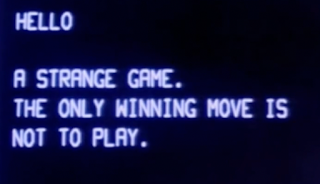The President-Elect has called for expanding the US nuclear arsenal, not just modernizing it (old warheads may not be good warheads). And when asked about whether this might lead to an arms race, he said woot!
Who wins arms races?
- Arms manufacturers and their stockholders
- Maybe Ken Waltz (who is already dead)
Yeah, that’s about it. How about who loses?
- Each country that is involved
- The taxpayers
- Pretty much everyone else.
Really? Is it that bad? Yes, it is. Why? There are two possibilities when it comes to a nuclear arms race: either the competition among nuclear powers to build more and more nuclear weapons upends the strategic stability of mutual assured destruction OR it does not.
A) If the various sides end up building systems that may be able to wipe out much, if not all, of the other side’s ability to retaliate, each side might face a “use it or lose it” temptation. And that is really, really bad. Some would argue that this kind of situation made it very hard to avoid World War I. Strategic stability took much effort to achieve and recognize–that mutual vulnerability was actually a good thing to help deter each side. Upsetting it is very dangerous, especially for an amateur who asks “why build them if you can’t use them?” Folks should be very nervous given that there really is nothing between Trump and nuclear war–as illustrated by Tom Nichols’s excellent use of Friends gifs.
B) If the arms race does not upset the strategic balance, then it is a gigantic waste of money. This is stuff that would cost hundreds of billions of dollars or trillions of dollars. How does one avoid deepening the deficits if one spends much, much more on stuff that does not really change anything?
The challenge, as Waltz and other structural realists argued, is that the system provides incentives for arms races–that the absence of a higher authority fosters a security dilemma, whereby any act to improve one’s own security decreases the security of others. The others then respond by trying to improve their security, making the first mover less secure. Any unilateral effort to improve one’s security is self-defeating–hence DILEMMA. It requires much effort and, yes, empathy, to come to agree that mutual vulnerability is better than the alternatives. Trump threatens to upend all of this. Not good. And for what gains? None as far as I can tell. So, we may end up being stuck with two possibilities: nuclear war or larger arsenals and wasted tax dollars.
One last thought: if Trump is Putin’s plaything, why would Putin want an arms race? Well, if the US becomes super-scary, it would make it harder for any Russians to oppose Putin’s regime. That garrison states, built to deal with external adversaries, foster centralization of authority and undermines resistance. Oh, and, yes, Trump, who is a fan of authoritarian regimes, would benefit from the generation of fear as well. Lovely.
As always, when it comes to nuclear war and arms races, the go-to is:
Steve Saideman is Professor and the Paterson Chair in International Affairs at Carleton University’s Norman Paterson School of International Affairs. He has written The Ties That Divide: Ethnic Politics, Foreign Policy and International Conflict; For Kin or Country: Xenophobia, Nationalism and War (with R. William Ayres); and NATO in Afghanistan: Fighting Together, Fighting Alone (with David Auerswald), and elsewhere on nationalism, ethnic conflict, civil war, and civil-military relations.


“Irresponsible” and “ridiculous” are, I think, the mildest words one can apply to Trump’s recent remarks on nuclear matters (and the arms race remark in particular).
Btw, an unpersuasive series of statements by Prof. Matthew Kroenig on the NewsHour this evening. This is the person, iirc, who earlier advocated an attack on Iran to ‘take out’ its nuclear facilities.
Btw again: I don’t know about Waltz, but I’m pretty sure that the ghost of John Herz (linked in the OP) is unquiet tonight. Cf. his unfortunately still relevant International Politics in the Atomic Age (1959).
Is this not the Age of Dominionists? According to them, the good will not suffer the nuclear war they unleash since they (not us, just them) will be raptured . For us, the lucky ones will already be dead, the rest of us it’s Mad Max times.